COVID-19: The CREGÉS takes action
CREGÉS COVID-19 INTERVIEWS
A series of short interviews with members of the Centre for Research and Expertise in Social Gerontology (CREGÉS) on the on the social issues of ageing in the context of the coronavirus pandemic. These interviews are hosted by Mélanie Couture, Institutional researcher at CREGÉS.

The Crisis Facing Older People Living with Neurodiversity and their Aging Carers: A Social Work Perspective
With Shari Brotman, Tamara Sussman, Zelda Freitas and Daniel Dickson, CREGÉS student member.
This new edition of the CREGÉS COVID-19 INTERVIEWS is inspired by the recently published article The Crisis Facing Older People Living with Neurodiversity and their Aging Carers: A Social Work Perspective. Mélanie Couture, PhD., Institutional researcher at CREGÉS, interviews the authors of the article to discuss the impact of the pandemic of neurodiverse older adults and their aging caregivers.

La pandémie Covid-19 : un contexte propice à la maltraitance des proches aidants?
With Sophie Éthier
In this new CREGÉS COVID-19 INTERVIEWS, we explore the sources and manifestations of caregiver mistreatment and also how the pandemic has exacerbated this issue. Finally, we suggest some ways to prevent this type of mistreatment.
-
Consult the infographic (In French)

Le fédéralisme et les soins de longue durée en temps de pandémie et au-delà.
With Daniel Béland
In this sixth edition of the COVID-19 INTERVIEWS, Mélanie Couture and Daniel Béland discuss the impact of the pandemic on long-term care and the current or potential role of the federal government in the area by comparing it with other Canadian provinces. This interview is a follow-up of a recent article by Daniel Béland and Patrik Marier.
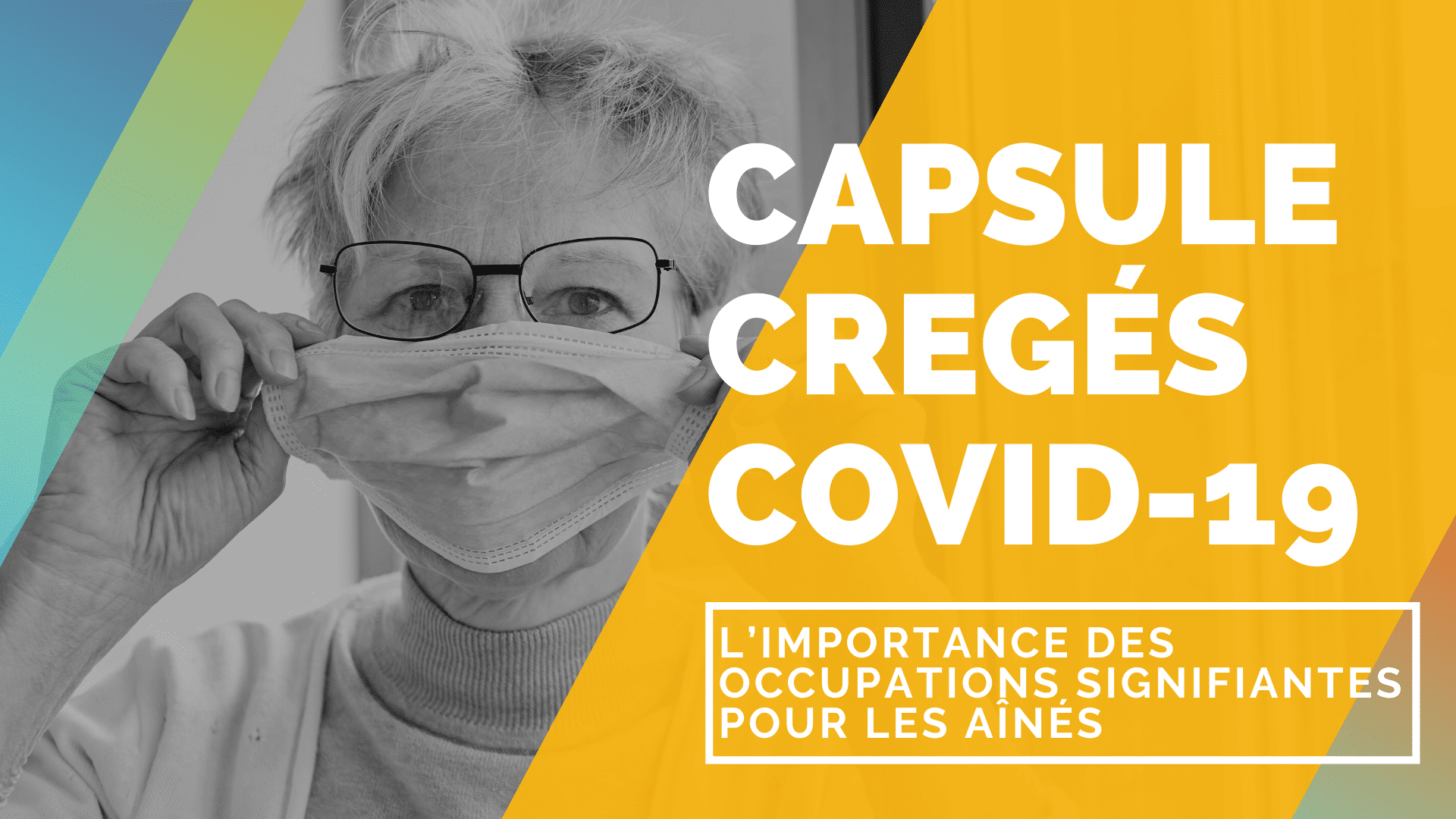
L’importance des occupations signifiantes pour les aînés.
With Marie-Michèle Lord
This fifth edition of the CREGÉS COVID-19 INTERVIEWS, also inspired by a recently published text, discusses the importance for older adults to carry out activities that are important to them and how to support them in the face of an occupational transition or occupational deprivation.
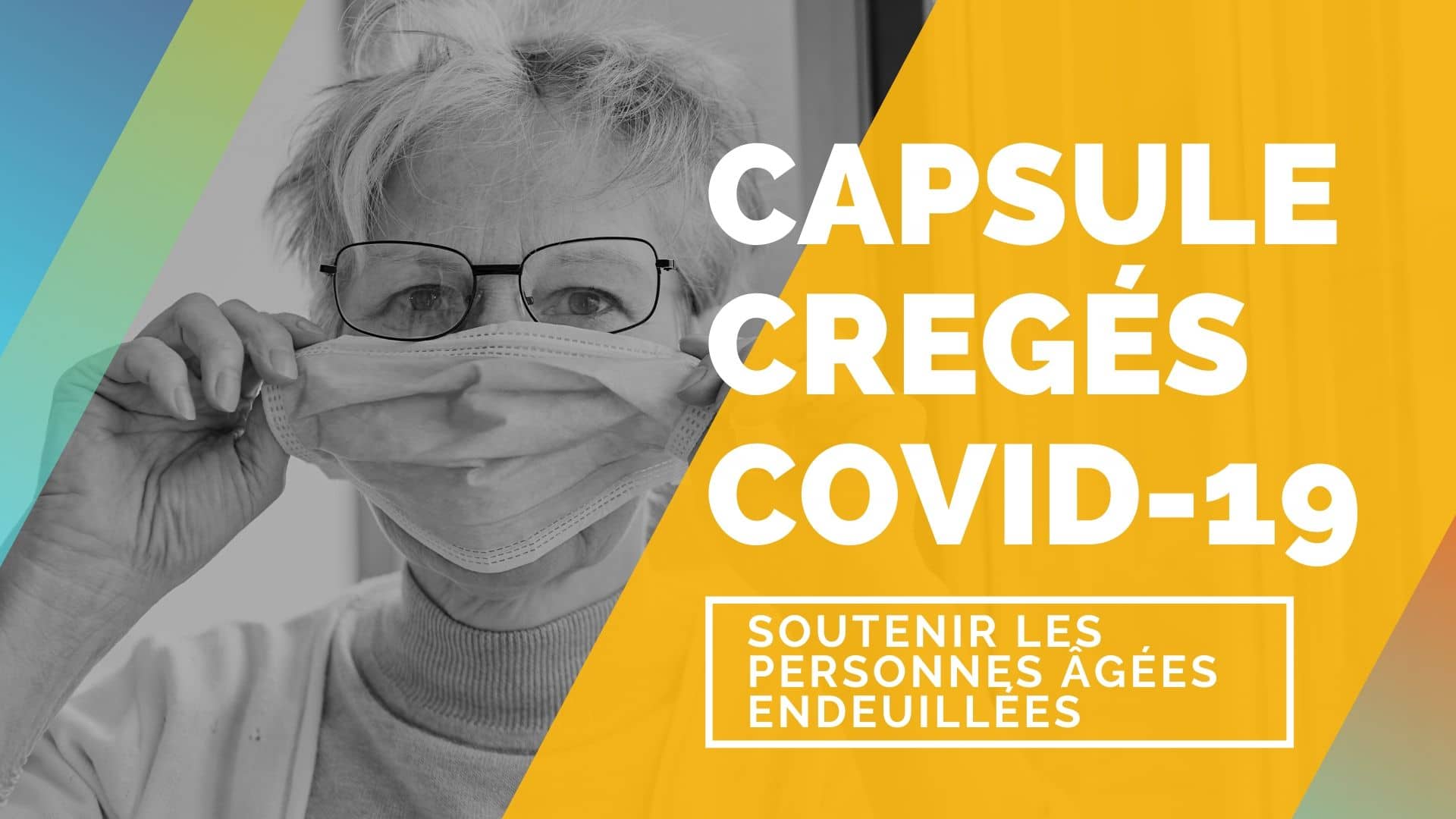
Soutenir les personnes âgées endeuillées
In this first edition of CREGÉS COVID-19 INTERVIEWS, we will focus on how to support older adults in grieving situations. We will explore the challenges our grieving older adults and our practitioners in this particular context as well as the solutions and resources that can be used to provide support.
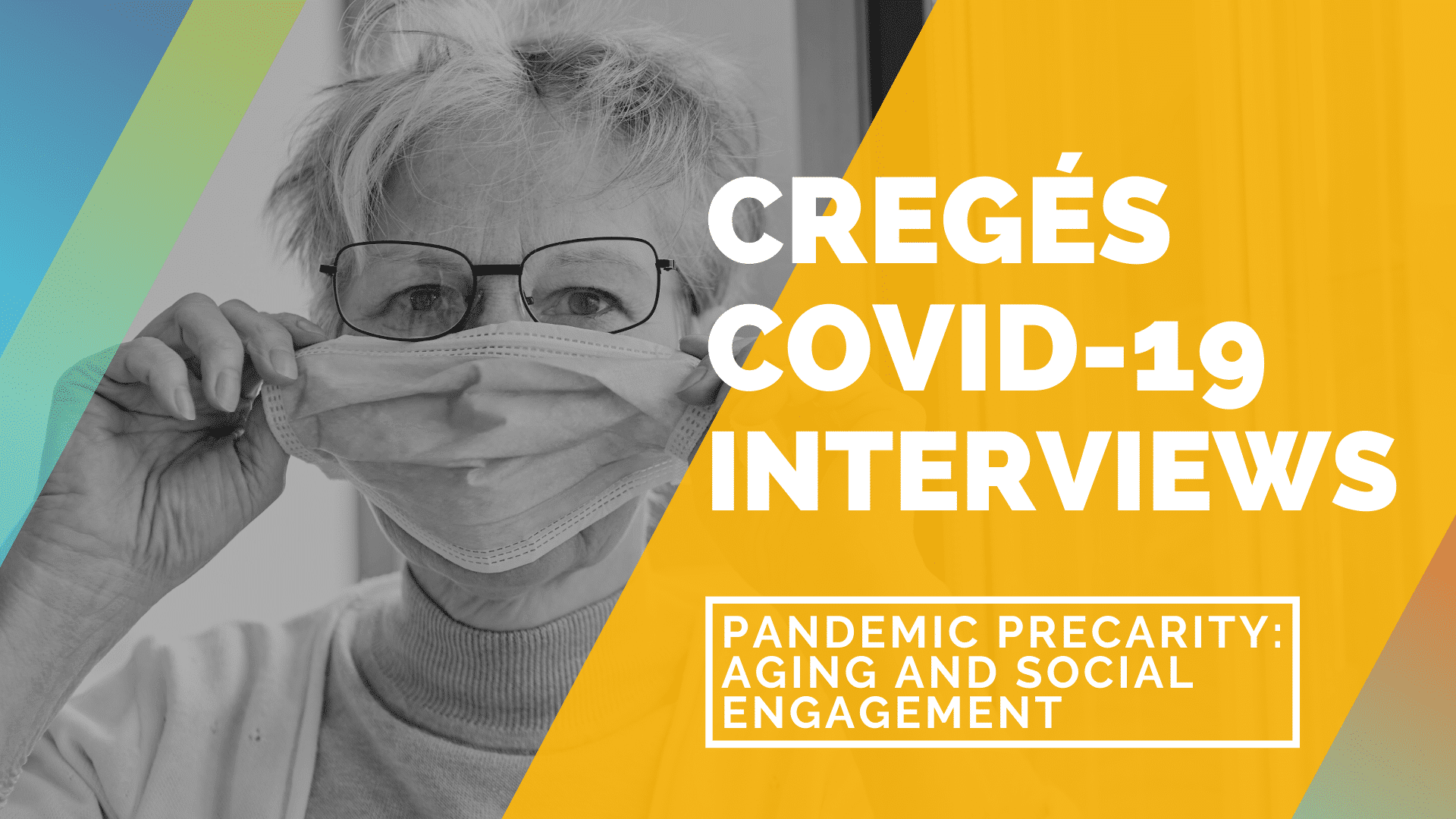
Pandemic precarity: aging and social engagement.
With Shannon Hebblethwaite and Laurel Young
In this fourth CREGÉS COVID-19 Interview inspired by a recently published article, we discuss the pandemic's role in exposing institutional failures within the leisure and social services sectors and further marginalizing precariously position.
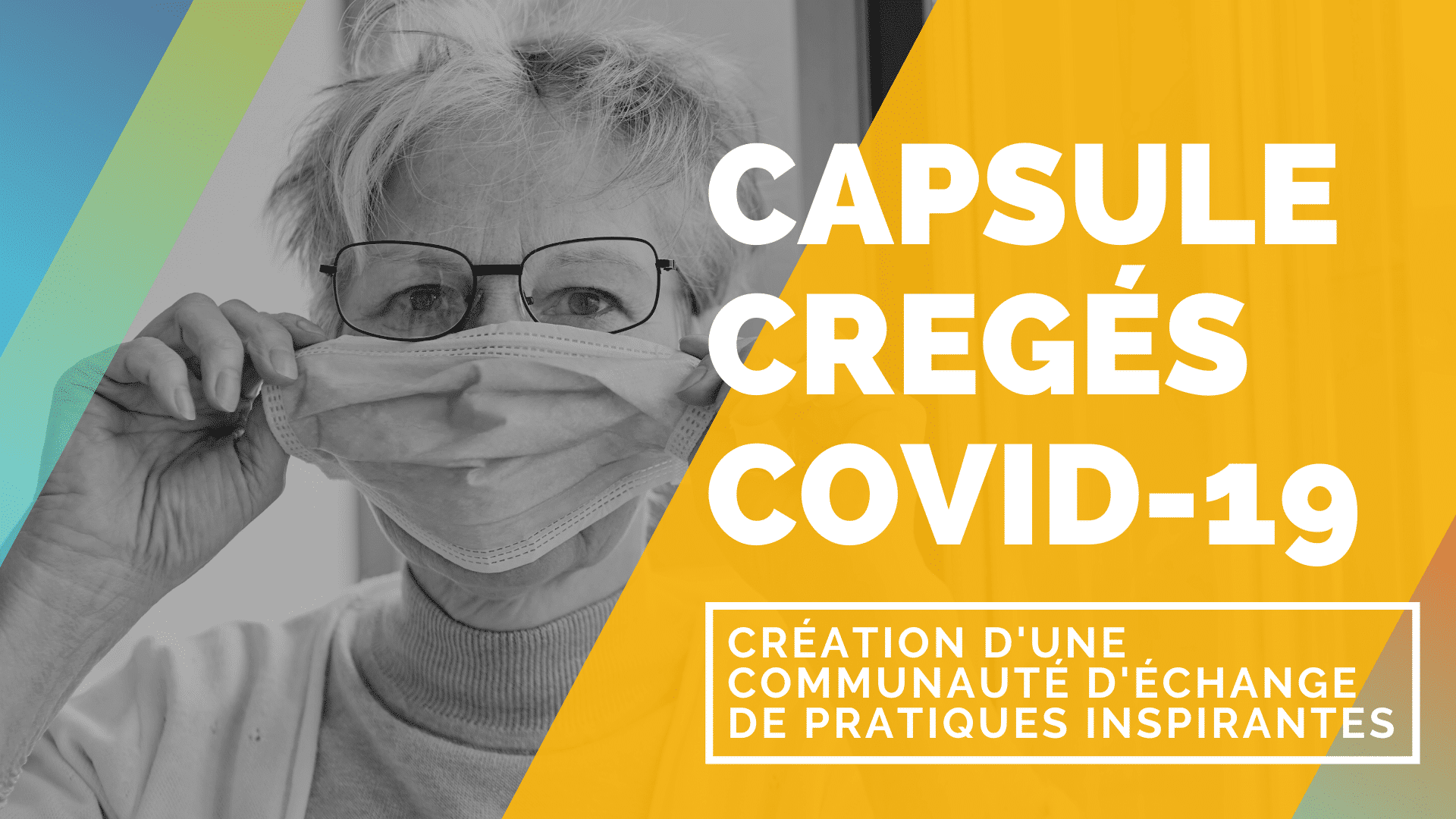
Création d'une communauté d'échange de pratiques inspirantes.
With Hélène Carbonneau
In this third edition of the CREGÉS COVID-19 INTERVIEWS, we will discuss the creation of a COVID-19 exchange community to support practitioners and share inspiring practices in community support for older adults, people with disabilities, caregivers and vulnerable clientèle. We will present the objectives and outcomes of this initiative.
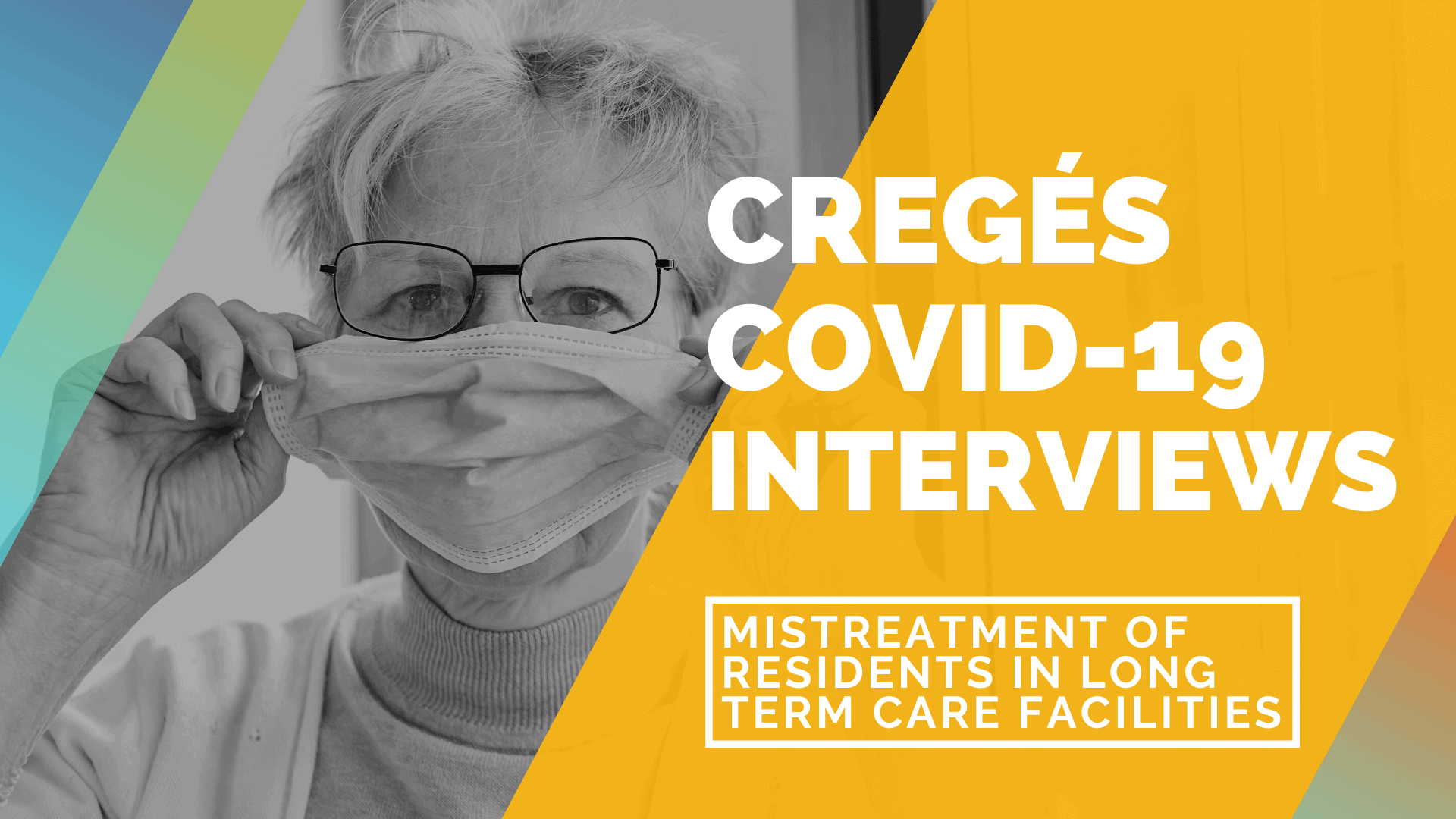
Mistreatment of residents in long term care facilities.
With Sarita Israel
In this second edition of CREGÉS COVID-19 INTERVIEWS, we will explore this delicate issue, which has been subject of much attention in the media recently. We will adress how the pandemic has pushed this issue into the forefront as well as explore possible solutions to counter mistreatment of older adults in this care context.
INITIATIVES AND COLLABORATIONS FROM OUR MEMBERS

Caregivers of Long-Term Care Residents in the Context of COVID-19: Current Knowledge, Inspiring Practices and Recommendations.
Rapid response led by the CREGÉS to help the Health and Social Services Network better support caregivers in the context of the pandemic and beyond.

Guide for collective mourning rituals during the COVID-19 pandemic.
Tool produced by the direction de la santé publique of the CIUSSS du Centre-Sud-de l'Île-de-Montréal, in collaboration with a team of experts from the CREGÉS of the CIUSSS West-Central Montreal composed of Valérie Bourgeois-Guérin, university researcher; Isabelle Van Pevenage, institutional researcher and Zelda Freitas, coordinator, domain of Expertise in Caregiving.
- To Know more
- Article with Zelda Freitas in the 360 newsletter of the CIUSSS West-Central Montreal

COVID-19 and the pandemic recovery phase for older adults with loss of autonomy.
Rapid response led by the INESSS in collaboration with the UETMISSS of CIUSSS West-Central Montreal, aiming to identify the services that should be provided in order to address the needs of older adults during the post-pandemic recovery phase.

COVID-19 exchange platform (private Facebook group).
Under the initiative of CREGÉS researcher Hélène Carbonneau, the Université du Québec à Trois-Rivières and l'Appui pour les proches aidants d'aînés created a Facebook group, to be a COVID-19 exchange platform for community practitioners. This group will allow its members to share inspiring practices and innovations in community support for older adults, people with disabilities, caregivers, or vulnerable populations.

COVID-19 Resource Directory: Older adults and Caregivers of older adults.
Website for archiving content shared within the "COVID-19 Exchange Platform". Find in a tab the content relevant to older adults and caregivers of older adults in loss of autonomy. A grant from the Quebec Network for Research on Aging (RQRV) was awarded to several CREGÉS members to evaluate these initiatives: Hélène Carbonneau (principal researcher), Sophie Éthier, Mélanie Couture, Ginette Aubin, Sébastien Grenier, Valérie Poulin and Martin Caouette (co-researchers).
WEBINARS WITH OUR MEMBERS

Public.Sphere + Public.Space, A Leisure Sciences Podcast: Leisure in the Time of COVID-19.
A year after the publication of the article ''Pandemic precarity: Aging and Social Engagement'' Shannon Hebblethwaite, CREGÉS researcher, engAGE director and one of the authors of the article, participated to a podcast by Leisure Sciences Journal on the evolution of leisure in the time of COVID19
Learn more :

COVID-19 et personnes âgées : La faillite de L’État au Québec et ailleurs.
In this conference, co-organized by the Centre de recherche sur le conflit et le Centre sur le vieillissement and the Saint-Paul University community on February 25th 2021, Julien Simard, student member of the CREGÉS, discusses the anthropological implications of managing of death, increased mortality and the end-of-life of older adults in the context of the Covid-19 pandemic.

The impact of COVID-19: Immigrant older adults and their families, challenges and recommendations.
In this video, Shari Brotman, CREGÉS researcher and principal investigator of the project “The Lived Experiences of Immigrant Older Adults (Greater Montreal), presents the main lines of the project as well as the challenges and recommendations resulting from the project within the context of the COVID-19 pandemic.

Canada and Europe Tackle COVID-19 and Isolation.
Organized by the European Connected Health Alliance, this Pop-Up Ecosystem Webinar took placed on July 2, 2020 presented a panel of experts including CREGÉS institutional researcher, Mélanie Couture. The panel discussed ways Canada and Europe can connect in areas they collaborated before the COVID-19 pandemic, such as healthy aging and look for common lessons and solutions to fight isolation during the pandemic.

Caregiving and the Risk of Older Adult Mistreatment.
On December 2nd, 2020, the Steinberg Centre for Simulation and Interactive Learning (McGill University) published an episode of the webcast series "McGill Cares" with Mélanie Couture who answered questions about the mistreatment of older adults as well as provided an overview on how often it happens, the factors that underlie it and the impact that COVID-19 is having on it. She also spoke about the tools used to identify and reduce mistreatment in caregiving situations.

Comparing Social Policy Responses to COVID-19 in Canada and the United States.
On November 10th, 2020, McGill University's Institute for Health and Social Policy (IHSP) presented a webinar with Daniel Béland and two other experts on how the US and Canada responded to the COVID-19 crisis, and what this growing social policy divide between both countries could mean for the future.

COVID-19 : Mieux soutenir les personnes proches aidantes de résidents en CHSLD.
On February 11, 2021, the CREGÉS and CvP Continuum Aînés organized a webinar with Margaux Reiss and Zelda Freitas from CREGÉS to highlight the principal needs of caregivers of residents in CHSLDs in the context of COVID-19 and propose inspiring practices to address them and make recommendations. This presentation was intended for healthcare providers and managers.

Culture Change in Long Term Care in Quebec: A Virtual Summit.
Presented by Recreotherapy and Seniors Action Quebec on September 9th, 2020, this poignant event showcased some of Canada’s leading researchers on Culture Change in Long Term Care, including Patrik Marier, CREGÉS Scientific Director. This summit was an opportunity to participate in an interactive discussion where the challenges and opportunities was examined with the ultimate outcome of creating a report and recommendations for the provincial government.

Long-Term Care Policy Under the Microscope: A conversation with Patrik Marier.
Organized by the McGill Institute for the Study of Canada (MISC) and the CREGÉS, this webinar with Patrik Marier, in conversation with Daniel Béland took place on June 16, 2020. This webinar complements the article COVID-19 and Long-Term Care Policy for Older People. .

Caring for Persons with Dementia in the Context of COVID 19: Navigating Stress, Loss and Grief.
Organized by the Alzheimer Groupe -AGI, this webinar with Tamara Sussman that take place on June 2, 2020 aims to reflect on the unique challenges faced by those who support people with dementia and discuss strategies to manage the inevitable stress, loss and grief associated with this essential role.
ARTICLES IN PEER-REVIEWED JOURNALS
COVID-19, promotion and provision of palliative care: reaching out, accounting for linguistic diversity.
Bilkis Vissandjée, Isabel Fernandez, Patrick Durivage, Zelda Freitas & Isabelle Van Pevenage. (2021). Global Health Promotion.
This article discusses the importance of linguistic diversity in the promotion and provision of safe, timely and appropriate palliative care which can be achieved through a sensitive assessment of different contexts of diversity.
COVID-19, federalism, and health care financing in Canada, the United States, and Mexico.
Daniel Béland & al. (2021). Journal of Comparative Policy Analysis: Research and Practice.
This paper argues that federal health financing regimes differ in ways that are shaping the agenda for post-pandemic reforms.
Personnes aînées et COVID-19 : Trajectoires de participation sociale.
Émilie Raymond, Mélanie Synnott et Frédérique Rivest. (2020). Revue canadienne de service social.
This article presents the methodology and emerging themes of the first interviews of this research project aiming to reconstruct the personal trajectory of seniors’ social participation since the beginning of the government confinement and social distancing measures.
Canadian Association of Music Therapists (CAMT) statement on singing during the COVID-19 pandemic.
Susan LeMessurier Quinn, Adrienne Pringle & Laurel Young (2020). Canadian Association of Music Therapists.
The purpose of this document is to present the current state of knowledge about singing and COVID-19 and to disseminate the best possible information so that all relevant stakeholders can make informed decisions.
Recognizing Older Individuals: An Essay on Critical Gerontology, Robin Hood, and the COVID-19 Crisis.
Annette Leibing (2020). Anthropology & Aging.
This article gives a short overview of the COVID-19 crisis in Québec in order to reflect on critical gerontology and draw attention to the need to critically analyse critical gerontology.
Resistance, Innovation, and Improvisation: Comparing the Responses of Nursing Home Workers to the COVID-19 Pandemic in Canada and the United States.
Robert Henry Cox, Daniel Dickson & Patrik Marier (2020). Journal of Comparative Policy Analysis: Research and Practice.
This article draws on narrative accounts from frontline workers and finds that despite variation in the severity of the outbreaks they experienced, nursing home workers in each jurisdiction demonstrated three types of responses to pandemic policy changes.
Barriers and facilitators to optimal supportive end-of-life palliative care in long-term care facilities: a qualitative descriptive study of community-based and specialist palliative care physicians' experiences, perceptions and perspectives.
Patricia Harasym, Sarah Brisbin, Misha Afzaal, Aynharan Sinnarajah, Lorraine Venturato, Patrick Quail, Sharon Kaasalainen, Sharon E Straus, Tamara Sussman, Navjot Virk & Jayna Holroyd-Leduc. (2020). BMJ Open.
This article describes the barriers and facilitators for optimal supportive end of life palliative care in long-term care facilities.
Pandemic Precarity: Aging and Social Engagement.
Hebblethwaite, S., Young, L. & Martin Rubio, T. (2020). Leisure Sciences.
In this article, the authors examines how the pandemic exposed the numerous institutional failures within the leisure and social services sectors in Canada. They argue that these failures enhanced the precarity of already marginalized older adults.
COVID-19 and long-term care policy for older people in Canada.
Béland, D. & Marier, P. (2020). Journal of Aging & Social Policy, 1-7.
In this article, the authors stress recent developments in Quebec, where a tragedy in a long-term care facility acts as a dramatic milestone. It exposes the problems facing long-term care facilities, considering the existing policy legacies and the possibility of this event facilitating comprehensive policy reforms in the wake of the COVID-19 pandemic.
ARTICLES IN NON PEER-REVIEWED JOURNALS
Ageism and COVID-19: What does our society’s response say about us?
Fraser, S., Lagacé, M., Bongué B., Ndeye, N., Guyot, J., Bechard, L., Garcia, L., Taler, V., CCNA Social Inclusion and Stigma Working Group, Adam, S., Beaulieu, M., D Bergeron, C., Boudjemadi, V., Desmette, D., Donizzetti, A. R, Éthier, S., Garon,S., Gillis, M., Levasseur, M., Lortie-Lussier, M., Marier, P., Robitaille, A., Sawchuk, K., Lafontaine, C. & Tougas F. (2020). Age and Ageing. Under Press.
This commentary highlights the ageism which emerged during the COVID-19 pandemic. Over 20 international researchers in the field of aging have contributed to this document.
Les soins de longue durée sous la loupe.
Marier, P. & Béland, D. (2020). Options Politiques. Dossier : La pandémie de coronavirus : la réponse du Canada.
In this article, the authors point out that it took a crisis of unprecedented proportions for the living conditions of older adults in long-term care facilities to mobilize the political leadership. They note the importance of developing a more social and deinstitutionalized vision of long-term care and, from a comparative perspective, they address the issue of provincial choices in long-term care.
Couvre-feu et canicules, une question urgente de santé publique.
Dans cet article, Julien Simard, Ph. D., membre étudiant du CREGÉS, aborde le sujet du couvre-feu et "l’incidence des vagues de chaleur sur les aînés assignés à domicile."
Soins de longue durée: les différentes approches des provinces.
In this interview, Patrik Marier, CREGÉS Scientific director, speaks about the provincial differences in their offer of long-term care and the importance of having a more social and less institutionalized vision of long-term care in the current context.
Resistance, Innovation, and Improvisation: Comparing the responses of nursing home workers to the COVID-19 pandemic in Canada and the United States.
Several media sources shared the results of a scientific article of Patrik Marier, scientific director and Daniel Dickson, student member at CREGÉS.
Fermeture de deux RPA à Trois-Rivières : Un aîné décède trois semaines plus tard.
In this article, Hélène Carbonneau, CREGÉS researcher, comments on the impact of relocation on older adults. This article raises the issue of mistreatment in private care facilities and the risks associated with the relocation of older adults.
Proches aidants et COVID-19 : Distanciation physique, visites restreintes… Les mesures se prolongent et affectent directement les plus vulnérables d’entre nous, ainsi que leurs proches aidants.
In this radio interview, CREGÉS researcher Sophie Éthier, researcher at CREGÉS and Magalie Dumas of L'Appui pour les proches aidants discuss how family caregivers have been affected by the pandemic and the issues it raises.
Montreal notary fighting financial exploitation of seniors.
In this article, Sarita Israel, coordinator of Area of Expertise to Counter Mistreatment at CREGÉS of the CIUSSS West-Central Montreal explains how the pandemic is aggravating the risk factors that make older adults more susceptible to financial mistreatment.
L’impact de la pandémie sur la santé mentale reste difficile à mesurer.
In this article, Valérie Bourgeois-Guérin notes the increase in distress calls and antidepressant prescriptions from older adults since the beginning of the pandemic.
Les aînés pourront fêter Noël hors CHSLD.
This article by Nora Lamontagne quotes several experts on the subject, including Shannon Hebblethwaite, who stresses the importance of striking a balance between the risks of catching the virus and the mental health risks of being isolated for so long
Opinion: Ageist attitudes toward seniors hurt us all.
In this article, CREGÉS researchers, Tamara Sussman and Shari Brotman, write about our society’s ageist attitude and how it influenced the way older adults were treated during the pandemic.
La valeur thérapeutique des occupations.
In this article, many occupational therapists, including CREGÉS researcher, Marie-Michelle Lord, speak about the occupations contributing to wellness, particularly in times of isolation. It highlights an issue revealed by the pandemic: The lack of meaningful occupation that hits harshly vulnerable populations, especially older adults.
PANDEMIC #9 - Mend the World.
In this podcast, CREGÉS researcher Tamara Sussman, comments on the Rabbi Ronnie Cahana case, one of the thousands of Quebeckers stranded in a CHSLD during the COVID-19 pandemic. She speaks specifically about how the Quebec health system reforms affected the COVID-19 response in long-term care.
Portraits in palliative care : Social Worker Zelda Freitas on the need to reform Residential care and support family caregivers.
In this portrait by Palliative Care McGill, Zelda Freitas, coordinator, Domain of Expertise on Caregiving at CREGÉS speaks about the challenges of caregiving in the context of COVID-19, the importance to include caregivers at the level of the palliative care plan, of her collaborations in promising research projects and her experience in supporting families bereaved by the pandemic.
Podcast: Parce que vieillir au Québec, c’est « notre affaire ».
In this podcast, Ginette Aubin, CREGÉS researcher, joins a panel to discuss social gerontology, home care and the living environments of older adults in Quebec. She speaks about the importance of countering the isolation of older adults and to promote their social participation.
Les places en CHSLD seront-elles encore convoitées?
In this article, Mélanie Couture, Institutional researcher and Sophie Éthier, university researcher at CREGÉS, speak about the image of CHSLDs and their future following the pandemic. They address the issues of mistreatment, access given to caregivers and CHSLDs that have passed from living environments to healthcare settings.
Manque d’intérêt pour le «vieux».
In this article, which deals with complacency and indifference towards "older" citizens and old buildings, Patrik Marier, Scientific Director of CREGÉS, discusses the lack of vision and leadership from governments in advocating for home care and the lack of recognition of the contribution of older adults in society.
COVID-19 Q&A: McGill experts on seniors and family caregivers during the pandemic.
In this article, Shari Brotman and Tamara Sussman, CREGÉS researchers, discuss the situation faced by older adults and family caregivers during the pandemic and the things to be done to improve the situation.
COVID-19 : Mistreatment and mental health.
In this episode, Sarita Israel, Coordinator, Area of Expertise to Counter Mistreatment and Dr. Alexandre Allard, Senior Psychiatry Resident at the Jewish General Hospital address these two key issues facing older adults that have been exarcebated by the increased isolation caused by the pandemic.
Seniors caring for seniors are pandemic's invisible victims.
Tamara Sussman and Shari Brotman, CREGÉS researchers, co-authored this editorial addressing the issue of senior caregivers on the front lines who are putting their health at risk. They question their protection and financial compensations available for these central actors of the home care system.
Âgisme, vieillissement et logement.
Julien Simard, CREGÉS student member and postdoctoral research intern at McGill University's School of Social Work, speaks about the housing market for low-income older adults. He also speaks about the concept of compassionate agism, a form of agist attitude which stands out more in this context of COVID-19.
Le deuil dans les arts et les grands rendez-vous à l'ère du confinement - Le soutien que peut apporter la culture.
In this radio show, Valérie Bourgeois-Guérin, CREGÉS researcher, speaks about the grieving process in a context where social support is limited or transformed. She also speaks about the support culture, arts and humour bring for the bereaved.
Est-ce ainsi que nous voulons vieillir?
In this context of the crisis affecting older adults, Patrik Marier, Scientific Director of CREGÉS, spoke of the underfunding of long-term care, the lack of resources and the low salaries of CHSLD staff, which are linked to the lack of consideration for older adults and the end of life. Anne-Marie Séguin, CREGÉS researcher, discusses the reasoning behind the choice of older adults to live in residences.
Il faut mettre fin à l’âgisme.
Many experts, including CREGÉS researchers Sophie Éthier, Patrik Marier et Kim Sawchuk sign a collective piece to express their concerns about the ageist attitudes consciously or unconsciously expressed during this pandemic.
Les deuils, petits et grands, en temps de pandémie.
Valérie Bourgeois-Guérin, CREGÉS researcher, talks about mourning during confinement and rituals that are turned upside down. She mentions the importance to take the time to talk about the subject to help alleviate certain anxieties and offer a sharing space for those who are grieving. She proposes creative alternatives to support and counter isolation of the bereaved.
L’urgence dans les résidences pour aînés.
Patrik Marier, CREGÉS Scientific Director, speaks about the deficiencies of the healthcare system, particularly the marginalization of long-term care. He discusses the importance of better remuneration but more importantly, the enhancement of the value of the work of people working with older adults and the importance of home-care after the COVID-19 crisis.
De déchirants adieux à distance au temps de la pandémie.
In this article, Valérie Bourgeois-Guérin, a researcher at CREGÉS, points out that a large number of people will have to go through mourning in a particular and unexpected context to which is added the isolation and solitude of confinement. She adds that this situation could create psychological distress and even more difficult grief.